高考英语语法专题复习-状语从句
高考英语句法复习专题-状语从句
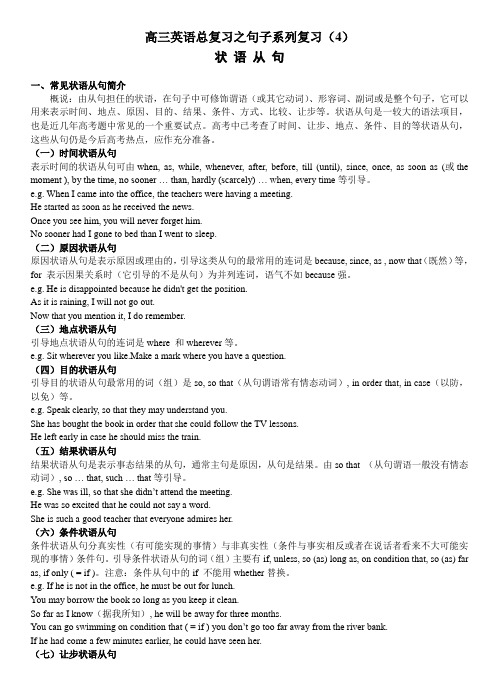
高三英语总复习之句子系列复习(4)状语从句一、常见状语从句简介概说:由从句担任的状语,在句子中可修饰谓语(或其它动词)、形容词、副词或是整个句子,它可以用来表示时间、地点、原因、目的、结果、条件、方式、比较、让步等。
状语从句是一较大的语法项目,也是近几年高考题中常见的一个重要试点。
高考中已考查了时间、让步、地点、条件、目的等状语从句,这些从句仍是今后高考热点,应作充分准备。
(一)时间状语从句表示时间的状语从句可由when, as, while, whenever, after, before, till (until), since, once, as soon as (或the moment ), by the time, no sooner … than, hardly (scarcely) … when, every time等引导。
e.g. When I came into the office, the teachers were having a meeting.He started as soon as he received the news.Once you see him, you will never forget him.No sooner had I gone to bed than I went to sleep.(二)原因状语从句原因状语从句是表示原因或理由的,引导这类从句的最常用的连词是because, since, as , now that(既然)等,for 表示因果关系时(它引导的不是从句)为并列连词,语气不如because强。
e.g. He is disappointed because he didn't get the position.As it is raining, I will not go out.Now that you mention it, I do remember.(三)地点状语从句引导地点状语从句的连词是where 和wherever等。
高考英语状语从句
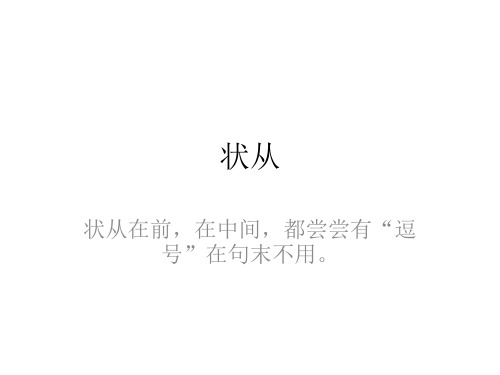
五、结果状语从句
六、条件状语从句
• if; 如果;考点:虚拟语气;if only与only if区别 • Unless“如果不”“除非…否则…” • 考点:相当于if…not…;Unless从句中可用否定, 双重否定表肯定 • Don't ask me to explain again unless you really don' t understand.
名词短语当连词
• Every/each time; the first/…/last time; next time; any time
• 考点:前面没介词;前后面没连词。本身 就是连词。
二、地点状语从句
• Where; wherever; everywhere; anywhere. • 考点:看翻译,与定从区分;everywhere, anywhere是副词,但能连接句子。
一…就…
• no sooner(一)… than(就)…; • hardly/scarcely(一)… when(就)…
• 考点①,此句型中的时态:主句“过完”, 从句“过去”。 • 考点②,No sooner; Hardly; Scarcely放句首 主句半倒装。 • once(一)…主句(就)…
• 特殊用法 when • ④句型:It be + 时间 + when,表“当…时,是… 时间” • It was an evening when we met for the first time. • ⑤when从句是主系表(表语为n.)结构,且主语一 致可变为as + n. • As a young man( =When he was a young man), he was fond of hunting.
高考英语重要语法知识:状语从句

高考英语重要语法知识:状语从句定义:在句中作状语的从句是状语从句,修饰主句中的动词、形容词或副词等。
状语从句由从属连词引导,从属连词在句中不充当句子成分,只起连接作用,状语从句放在句首时,要用逗号,放在句尾时不用。
分类:根据意义上的不同,状语从句可分为:①时间状语从句②地点状语从句③原因状语从句④目的状语从句⑤条件状语从句⑥结果状语从句⑦让步状语从句⑧方式状语从句⑨比较状语从句一、时间状语从句引导时间状语从句的连词有:as, when(whenever),while, before, after, as soon as, until(till), since,every/each/next time, once.( as, when, while都有“当……的时候”,可以互用)◆When、While、as的区别:①when是at or during the time ,既指时间点,也可指一段时间,因此when引导的时间状语从句中的动词可以是终止性动词,也可以是延续性动词;while是during the time,只指一段时间,所以while从句中的动词必须是延续性动词。
②when说明从句的动作和主句的动作可以是同时,也可以是先后发生;when从句多用一般过去时while主从句动作或状态同时发生。
while从句多用过去进行时eg. When the teacher came in,we_____________________(talk).When the clock struck twelve,all the lights went out.When we arrived at the station,the train had left.While we _____________(have)supper,all the lights went out.While I was writing letters last night,he was watching TV.④when和while还可作并列连词when表示“就在那时”; while表示“然而”,表前后意思的对比。
高考英语总复习:状语从句
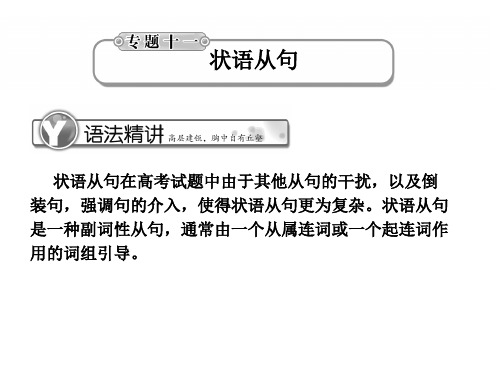
状语从句在高考试题中由于其他从句的干扰,以及倒 装句,强调句的介入,使得状语从句更为复杂。状语从句 是一种副词性从句,通常由一个从属连词或一个起连词作 用的词组引导。
1. 时间状语从句 常见的连词(组):
when, while, as, before, after, once, till, until, as soon as, n, scarcely ...when, no sooner ...than等。
It wasn t long before he told me about the news. 没多久他就告诉了我那条新闻。 ② 不等……就……; 在……之前就…… The telephone rang off before I could answer it. 我还没来得及接电话,电话就挂断了。 ③ 刚……就…… He hardly entered the room before he heard the telephone ring. 他刚进屋电话铃就响了。 ④ 先……再…… You can have a few days to think about it before you make your decision. 做决定之前你还有几天时间考虑。
注意点如下: (1) when, while, as引导的时间状语从句 as表示“当……的时候”,往往和when/ while通用,但它着重强调主句与从句 的动作或事情同时或几乎同时发生。when(at or during the time)既可以表示在某 一点的时候,又可以表示在某一段时间内,主句与从句的动作或事情可以同时发生 也可以先后发生。while强调一段时间,仅表示从句和主句的动作同时发生,并且有 延续意义,该从句中的动词一般要用延续性动词,从句中常用过去进行时态或一般 过去时态;当when表示a period of time时,两者可以互换。 She came up as I was cooking.(同时) 在我做饭时,她走了过来。 When we were at school, we went to the library every day.(在一段时间内) 当我们在学校时,每天都去图书馆。
高考英语考前玩转高频语法系列-状语从句
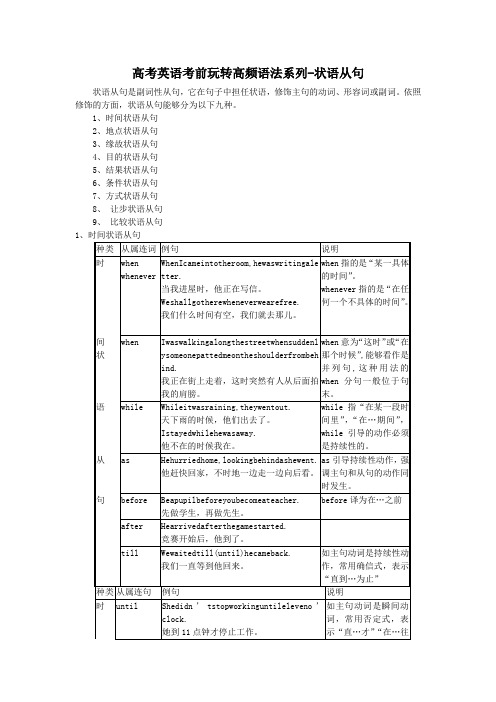
高考英语考前玩转高频语法系列-状语从句状语从句是副词性从句,它在句子中担任状语,修饰主句的动词、形容词或副词。
依照修饰的方面,状语从句能够分为以下九种。
1、时间状语从句2、地点状语从句3、缘故状语从句4、目的状语从句5、结果状语从句6、条件状语从句7、方式状语从句8、让步状语从句9、比较状语从句1、时间状语从句【专项训练】:Ⅰ、选择填空:1、YoulikesportsI’dliketoread.A、whenB、whileC、butD、yet2、weweresinging,theteachercamein.A、BeforeB、afterC、AsD、Until3、Iwasabouttoleavemyhousethephonerang.A、whileB、whenC、asD、after4、Theydidnotstopfightingtherewasnoenemyleft.A、untilB、afterC、whenD、since5、Ihavenotseenhimhewenttocollege.A、whenB、beforeC、asD、since6、Itisfivedayswecamehere.A、whenB、beforeC、asD、since7、Itwasnotlonghegottoknowit.A、whenB、beforeC、afterD、until8、Weshallgowearefree.A、wheneverB、whateverC、whereverD、however9、IliveImustservethepeopleheartandsoul.A、WhenB、SolongasC、AssoonasD、Oncondition10、IwasreadinganovelhewaswatchingTV.A、whenB、whileC、beforeD、as11、Putthemedicineyoucaneasilygetit.A、sothatB、whereC、whichD、there12、WewillgothePartywantsustogo.A、whereverB、thereC、totheplaceD、which13、thereisawillthereisaway.A、WhenB、WhereC、WhetherD、How14、Iamgoingyouwentlastweek.A、whereB、whereverC、whenD、theplace15、yougo,youshouldbearthemotherlandinyourmind.A、WhereB、WhereverC、WhateverD、However16、weatherpermits,we’llhaveanouting.A、ForB、ThoughC、WhileD、If17、Youwon’tsucceedharder.A、unlessyouwillworkB、unlessyouworkC、unlessyoudon’tworkD、ifyouwon’twork18、Iwonderifheus,andIthinkifheuswe’llbeabletocompletethetaskaheadoftime.A、helps,helpsB、willhelp,helpsC、helps,willhelpD、willhelp,willhelp19、Idon’tliketobeinterruptedifI.A、speakB、willspeakC、amspeakingD、spoke20、Ifyouthisexperimentyouwillunderstandthetheorybetter.A、willbedoingB、havedoneC、willhavedoneD、woulddo21、IwouldliketodoitIlikeit.A、sinceB、becauseC、becauseofD、nowthat22、everybodyishere,Let’ssetoff.A、SinceB、BecauseC、ForD、After23、Itwashewasillthathewasabsentyesterday.A、becauseB、asC、sinceD、nowthat24、itisraining,wehadbettertakeataxi.A、ForB、AsC、BecauseofD、When25、“Whycan’tyoudoitnow?”“I’mtoobusy.”A、SinceB、AsC、BecauseD、For26、Hemusthavepassedthisway,herearehisfootprints.A、sinceB、becauseofC、nowthatD、for27、everybodyishere,Let’sbeginourmeeting.A、NowthatB、BecauseC、ForD、When28、Hisspeechmadedeepimpressionontheaudiencethattheycouldhardlyforgetit.A、suchaB、soaC、soD、such29、Theyworkedhardtheyfinishedtheirworkaheadoftime.A、soB、sothatC、suchthatD、soasto30、Hewasweakhecouldn’tstandup.A、such,thatB、so,thatC、very,thatD、so,asto31、Theforeignerspokehisinterpretercouldhardlycatchhiswords.A、suchfastthatB、sofastC、sofastthatD、sofastlythat32、Thebookisitgivesawrongideaofthefacts.A、sowritingthatB、suchwrittenthatC、suchwritingthatD、sowrittenthat33、Thehousecostwedidn’tbuyit.A、somuchmoneythatB、somanymoneythatC、suchmuchmoneythatD、suchmanymoneythat34、Itisallofuscandoit.A、soeasyexercisethatB、sucheasyanexerciseC、sucheasyexerciseD、soeasyanexercisethat35、Shehassheremembersallthenamesofthestudentsshehastaught.A、sogoodmemorythatB、suchagoodmemorythatC、suchgoodmemorythatD、goodmemory36、TheystoppedatTianjingtheymightvisittheTVtower.A、soB、becauseC、sothatD、inorder37、Weallgotupearlywemightstartatsix.A、inorderthatB、inordertoC、soD、soasto38、Letthedogloosesothatithavearun.A、shouldB、mustC、couldD、need39、clearlysothatyourteacheryoucorrectly.A、Write,canunderstandB、Havingwritten,canunderstandC、Towrite,couldunderstandD、Writing,willunderstand40、Hestartedearlysothathethereintime.A、couldgetB、gotC、hadgotD、wouldhavegot41、itwaslate,shewentonworking.A、ThoughB、BecauseC、SinceD、Whether42、wefail,wetrying.A、Evenif,don’tstopB、Eventhough,won’tstopC、Even,willnotstopD、Evenalthough,shallneverstop43、thepainwasbad,hedidnotcomplain.A、Although,butB、Though,butC、Though,yetD、Even,still44、physics,helikesmathsbetter.A、AshemuchlikesB、MuchashelikesC、MuchlikesasheD、Likesmuchashe45、telephones,tellhimI’mout.A、NomatterwhoeverB、WhoC、WhoeverD、Anyone46、We’llcarrythereformtotheendhappens.A、nomatterhowB、whateverC、anythingD、nomatterwhich47、Ittakestimetogotherebyplanethanbyship.A、farfewerB、farlessC、muchfewerD、moreless48、Heistallerthaninhisclass.A、othersB、allthestudentsC、anyotheroneD、theother49、itwasfinishedintime.A、AstheworkwasdifficultB、DifficultastheworkwasC、DifficultaswastheworkD、Aswastheworkdifficult50、IamsorryIhavecausedsomuchtrouble.A、thatB、forC、asD、since51、hecame,hewouldbringusalotofflowers.A、EverytimesB、onetimeC、EverytimeD、Onceatime52、I’lltellhimaboutitIseehim.A、assoonasB、sosoonasC、whileD、as53、IhadhardlysatdownthetelephonerangA、thanB、whenC、asD、after54、Sityoulike.A、whereB、attheplaceC、asD、wherever55、hewasn’treadyintime,wewentwithouthim.A、SinceB、AsC、ForD、Becauseof56、Allplantsneedairtheyneedwater.A、likeB、asifC、asD、so57、Workhardyoucansucceed.A、inordertoB、sothatC、forfearthatD、incase58、IfyouIwillgowithyou.A、gotoB、wentC、willD、shouldgo59、Thehardheworks,hewillmake.A、thegreaterB、thegreaterprogressC、andthemoreD、more60、wehavethoughtitover,we’lltakesteps.A、Till,notB、When,noC、Until,anyD、Until,noⅡ、改错1、Itwon’tmatterevenherefuses.2、Jimimaginedthatthewholeworldknewofhisachievements,wheninfactonlyafewpeoplehadheardofit.3、Herealizedthathishousemusthavebeenbrokenintotheminutehegothomeandsawthateverythingwasinamess.4、Hewaslookingforthedictionarywheneverhethoughthemighthaveputit.5、Nomatterifheisfree,hemustgotothelibrary.6、IhavenotmissedaplayoraconcertwhenIwasseventeenyearsold.7、NexttimethatIplantotravelinLondon,I’mgoingtotakeaplane.8、I’mnotgoingtotalkonthepointanyfurther,thoughitisneitherimportantnorveryinteresting.9、MuchsinceIlikeallthebooks,Ican’taffordtobuythem.10、Alicwaswaitingforthebusthenshenoticedathiefrunningoutofashop.11、Ithasbeentwoandahalfmonthsagosinceheleft.12、Thoughtheworkwasdifficult,butwemanagedtofinishitintime.13、ThetestshowsthatJackhasamuchquickermindthananystudentinhisclass.14、HeleftforGuangzhoubytrainlastMonday.Heoughttohavearrived,Ithink..15、Theywrotetothebossinordertheycouldimprovetheirworkingconditions.16、Hegoesfishingwhereverhehastime,whichisnotoften.17、Idon’tknowwhenhecomestomorrow.Ifhecomes,letmeknowatonce.18、Whenyoureadabook,you’dbettermakeamarkthatyouhaveanyquestions.19、Shipsaremuchmoreslowerthanplanesthatfewpeopletakethemonbusiness.20、Shehassuchlittleeducationthatsheisunfitforthejob.【答案】:Ⅰ、1、 B 2、C 3、B 4、A 5、D 6、D7、B 8、A 9、B 10、B 11、B 12、A13、B 14、A 15、B 16、D 17、B 18、B19、C 20、B 21、B 22、A 23、A 24、B 25、C26、D 27、A 28、A 29、B 30、B 31、C 32、D33、A 34、D 35、B 36、C 37、A 38、C 39、A40、A 41、A 42、B 43、C 44、B 45、C 46、B47、B 48、C 49、B 50、A 51、C 52、A 53、B54、D 55、B 56、C 57、B 58、C 59、B 60、D Ⅱ、1、even后加if2、when—while3、minute—moment4、whenever—wherever5、if—whether6、when—since7、that去掉或改为when 8、though—because 9、since—as10、then—when 11、ago去掉12、but去掉13、any后加other 14、 15、order后加that16、wherever—whenever17、第一个comes—willcome〔宾从时态不限〕18、that—where19、more去掉20、such—so。
高考英语专项复习:状语从句

状语从句状语从句在高考试题中由于其他从句的干扰,以及倒装句,强调句的介入,使得状语从句更为复杂状语从句是一种副词性从句,通常由一个从属连词或一个起连词作用的词组引导状语从句1 时间状语从句常见的连词(组):when, while, as, befre, after, nce, till, until, as sn as, nw that, hardly when, scarcely when, n sner than等可以引导时间状语从句的副(介)词(短语)或名词短语:directly, instantly, iediately, by the tie, the ent, the secnd, the inute, the instant, every tie, each tie, net tie, the last tie等注意点如下:(1) when, while, as引导的时间状语从句as表示“当……的时候”,往往和when/ while通用,但它着重强调主句与从句的动作或事情同时或几乎同时发生when(at r during the tie)既可以表示在某一点的时候,又可以表示在某一段时间内,主句与从句的动作或事情可以同时发生也可以先后发生while强调一段时间,仅表示从句和主句的动作同时发生,并且有延续意义,该从句中的动词一般要用延续性动词,从句中常用过去进行时态或一般过去时态;当when表示a perid f tie时,两者可以互换She cae up as I was cing(同时)在我做饭时,她走了过When we were at schl, we went t the library every day(在一段时间内)当我们在学校时,每天都去图书馆While they were watching TV, I was preparing yself fr the cing eainatin他们在看电视,而我在为即将到的考试做准备Strie while the irn is ht 趁热打铁( 不可用as或when,这里的while意思是“趁……”)一、when可以和延续性动词连用,也可以和短暂性动词连用;而while和as只能和延续性动词连用① Why d yu want a new jb when yu've gt such a gd ne already?(get为短暂性动词)你已经找到如此好的工作,为何还想再找新的?②Srry,I was ut when yu called e.(call为短暂性动词)对不起,你打电话时我刚好外出了③Strie while the irn is ht.(is为延续性动词,表示一种持续的状态)趁热打铁④ The students t ntes as they listened.(listen为延续性动词)学生们边听课边做笔记二、when从句的谓语动词可以在主句谓语动作之前、之后或同时发生;while和as从句的谓语动作必须是和主句谓语动作同时发生1.从句动作在主句动作前发生,只用 when①When he had finished his hewr,he t a shrt rest.(finished先发生)当他完成作业后,他休息了一会儿②When I gt t the airprt,the guests had left.(gt t后发生)当我赶到飞机场时,客人们已经离开了2.从句动作和主句动作同时发生,且从句动作为延续性动词时,when,while,as都可使用①When /While /As we were dancing,a stranger cae in.(dance为延续性动词)当我们跳舞时,一位陌生人走了进②When /While /As she was aing a phnecall,I was writing a letter.(ae为延续性动词)当她在打电话时,我正在写信3.当主句、从句动作同时进行,从句动作的时间概念淡化,而主要表示主句动作发生的背景或条件时,只能用 as这时,as常表示“随着……”;“一边……,一边……”之意① As the tie went n,the weather gt wrse.(as表示“随着……”之意)② The atsphere gets thinner and thinner as the height increases.随着高度的增加,大气越越稀薄③As years g by,hina is getting strnger and richer.随着时间一年一年过去,中国变得越越富强了④The little girls sang as they went.小姑娘们一边走,一边唱⑤The sad ther sat n the radside,shuting as she was crying.伤心的妈妈坐在路边,边哭边叫4.在将时从句中,常用when,且从句须用一般时代替将时①Yu shall brrw the b when I have finished reading it.在我读完这本书后,你可以借阅②When the anager ces here fr a visit net wee,I'll tal with hi abut this.下周,经理这参观时,我会和他谈谈此事三、when用于表示“一……就……”的句型中(指过去的事情)sb.had hardly(=scarcely) dne sth.when...=Hardly / Scarcely had sb.dne sth.when...①I had hardly /scarcely clsed y eyes when sene nced at the dr.=Hardly / Scarcely had I clsed y eyes when sene nced at the dr.我刚一闭上眼,就有人在敲门了②I had hardly /scarcely entered y r when the telephne rang.=Hardly /Scarcely had I entered y r when the telephne rang.我刚一走进房门,电话就响了(2) befre引导状语从句时的常见重点句型①It will (nt) be befre还要……才,要不了多久就……It was (nt) befre 过了……才(没多久就……)It was a lng tie befre I gt t sleep过了好长时间我才睡着了It wasn t lng befre he tld e abut the news没多久他就告诉了我那条新闻②不等……就……;在……之前就……The telephne rang ff befre I culd answer it我还没得及接电话,电话就挂断了③刚……就……He hardly entered the r befre he heard the telephne ring他刚进屋电话铃就响了④先……再……Yu can have a few days t thin abut it befre yu ae yur decisin做决定之前你还有几天时间考虑(3)since 引导的从句用延续性动词的过去式(包括过去完成时)时,则从句的动作已经结束,从句意思是否定的如果从句的动词是延续性动词的现在完成时态,则从句意思是肯定的He has never been t see e since I was ill我病愈后,他一直未看我(不再生病了)He has never been t see e since I have been ill我病了,他一直未看我I haven t heard fr hi since he lived here自他从这里搬走,我就没有收到他的信(不住在这儿了)(4) till, until如果till与until用在肯定句中时,则主句中谓语动词部分所表示的动作或状态一直延续到某时或某个动作发生时才结束注意它的倒装句和强调句I didn t recgnize she was y classate until she t ff her dar glasses=Nt until she t ff her dar glasses did I recgnise she was y classate=It was nt until she t ff her dar glasses that I recgnised she was y classate直到她摘下墨镜,我才认出她是我的同学2 原因状语从句引导原因状语从句的常见连词或短语:as, because, since, nw that, cnsidering that, seeing that(鉴于……)注意以下几点:(1) because, since, as, fr, nw thatbecause语气最强,用于回答why的提问,可与强调词nly, just 以及否定词nt 连用但不可以与s连用since 引导的从句语气次于because引导的从句,常表示稍加分析后而推断出的原因,或指人们已知的事实,比as正式一些,常置于句首as 语气最弱,其原因只是对结果的附带说明,一般放在句首fr虽然解释为“因为”但只是一个并列连词,它也常引导句子表示原因,但不是原因状语从句,它是一个并列句fr所提供的理由是一种补充性的说明,表示推测的理由nw that意为“既然,由于”表示由于人们已知的事实或正在发生的事而产生某个结果He failed because he was careless他因粗心而失败了Since everyne has ce, let s begin ur eeting既然大家都了,我们开会吧As all the seats were full, he std there所有的座位都满了,他只好站那儿It ight have rained last night fr the grund is wet昨晚可能下雨了,因为地面是湿的Nw that the ids have left he we have a lt f etra space由于孩子们离开了家,所以我们有了额外的空间3 地点状语从句地点状语从句常由下列连词引导:where, wherever等Yu ay find hi where his brther lives你可能会在他哥哥居住的地方找到他Yu are free t g wherever yu lie你可以去你想要去的任何地方Anywhere he went, he gt war welce无论他走到哪儿,都受到热烈欢迎The girl taes the dll with her everywhere she ges这个女孩无论去哪都带着她的布娃娃Where there is a will, there is a way 有志者事竟成4 结果状语从句结果状语从句常由下列连词引导:s that,such that,s that等要注意以下几个问题(1) 五种结构:①s+adj/adv+that②such (a/an+adj)+n+that③s+adj+a/an+n+that=such a/an+adj+n+that④s any/uch/few/little(少)+n+that⑤such+(adj) +n (u/pl)+ thatHe spe s fast that I culdn t fllw hi他说的如此的快,我跟不上他It was such a lvely day / s lvely a day that we all went swiing今天天气如此的好,我们大家都去游泳了(2) s或such置于句首时,主句常用倒装It was such a lvely day / s lvely a day that we all went swiing=Such a lvely day was it that we all went swiing今天天气如此的好,我们大家都去游泳了(3)注意以上结构与定语从句s/such as的区别This is such an interesting/s interesting a fil that everyne wants t see it这是一部很有趣的电影以至于每个人都想去看5 目的状语从句目的状语从句由下列连词引导:s that, in rder that, fr fear that, in case等(注:s that也可用引导结果状语从句)s that, in rder that引导的目的状语从句中常需用情态动词s that引导的目的状语从句只能放在主句之后in rder that 引导的目的状语从句可以放在主句之前或之后We set ut early s that we culd see the sunrise我们很早出发以便能看到日出He sent the letter by air ail s that it ight reach the in tie他空邮这封信以便他们能及时收到6 条件状语从句条件状语从句分为真实条件句和非真实条件句(用在虚拟语气中)注意:在真实条件句中,常用一般时态代替将时常由下列连词引导条件状语从句:if, unless, suppse, suppsing, prviding (that), prvided (that), given (that), in case, n cnditin that, as lng as, s lng as, s far as等(1) unless=if ntYu will fail unless yu study hard除非你努力,否则你就要失败(2) suppse, suppsing, prviding(that), prvided(that), given(that)= ifGiven that he supprts us, we ll win the electin如果他支持我们,我们就会赢得选举(3)n cnditin that, as lng as, s lng as = nly ifAs lng as yu dn t lse heart, yu will succeed只要你不灰心,你就会成功(4) as(s) far asS far as I a cncerned, I in favur f “ercy illing”就我个人而言,我支持安乐死7 让步状语从句引导让步状语从句的连词:althugh, thugh, as, even if, even thugh,while, whether r, whever, whatever, hwever, n atter+疑问词等注意以下几点:(1) althugh, thugh引导让步状语从句时,主句前不能用but,但可以加yet, stillThugh it was raining hard, yet they didn t stp wring尽管下着大雨,他们仍然在工作(2) as引导让步状语从句时,必须用前置结构,通常是从句中的表语、状语或动词原形放在句首,放在句首的名词前的冠词要去掉Thugh he is a child, he nws a lt=hild as(thugh)he is, he nws a lt尽管他是个孩子,但他仍知道的很多(注意在child前不要用冠词)Thugh I lie it very uch, I wn t buy it=Much as I lie it, I wn t buy it尽管我非常喜欢它,但我也不会买它(3)whether r (nt ) 引导的从句,提供两个对比的¡°尽管¡±情况,含有条件意味(Whether yu)Believe it r nt, it is trueWhether yu ce here r we g there, the tpic f discussin will reain unchanged不管是你这儿还是我们去那儿,讨论的主题保持不变(4) 疑问词+ever=n atter +疑问词Whever yu are, yu ust shw yur pass无论你是谁,你都必须出示你的通行证Whenever yu ce, yu are welce8 方式状语从句引导方式状语从句的连词或短语:as, as if, as thugh,the way等注意以下几点:(1) as引导方式状语从句时意为¡°按照¡±,¡°如同¡±,前面常用加强语气I did it just as yu tld e = I did it just as tld t我是按照你的吩咐做的He didn t win the atch as epected(2) as if和as thugh 引导的从句中,谓语常用虚拟语气,有时也用陈述语气It sees as if it were ging t rain(3)连词while 和whereas 可以表示对比Whereas he is rather lazy, she is quite energetic注意状语从句中的省略现象(1) 连接词+过去分词Unless repaired, the washing achine is n use(2) 连词+现在分词L ut while crssing the street(3)连词+形容词/其他常见的有if necessary,if pssible,when necessary,if any等(4) 比较状语从句中的省略He arrived he half an hur earlier than (he had been) epected例1My parents dn’t ind what jb I d I a happy(2009•陕西)A even thughB as sn as as lng as D as thugh解析:选考查状语从句根据题干意思可知,此处是条件状语从句as lng as只要;even thugh引导让步状语从句,意为“即使”;as sn as引导时间状语从句,意为“一……就……”;as thugh引导方式状语从句,意为“仿佛,好象”例2—Shall we have ur picnic trrw?—it desn’t rain (2009•山东)A UntilB While Once D If解析:选D考查交际用语答句句意为:如果明天不下雨的话例3She had just finished her hewr her ther ased her t practise playing the pian yesterday(2009•福建)A whenB while after D since解析:选A考查状语从句由句意可知,此处when用作并列连词,意为“这时”例4Yu d better nt leave the edicine ids can get at it(2008•山东)Aeven if Bwhich where Ds that解析:选句意为:你最好不要把药放在小孩子够得着的地方where引导地点状语从句even if 即使;which 不引导状语从句;s that 为了;以至于;引导目的或结果状语从句例5There were se chairs left ver everyne had sat dwn(2008•四川)A whenB until that D where解析:选A句意为:大家都坐下之后,还有一些椅子空着when 当……时候,引导时间状语从句,符合题意until 直到,引导时间状语从句,但与题意不符;that不引导状语从句;where引导地点状语从句例6Occasins are quite rare I have the tie t spend a day with y ids(2008•山东)Awh Bwhich why Dwhen解析:选D句意为:我很少有机会和孩子在一起待上一天的时间when在此处引导定语从句,修饰先行词ccasins(机会),并在从句中作时间状语wh和which是关系代词,定语从句中不缺少主语、宾语、表语,故排除;why引导定语从句时表示原因,与题意不符例7Trrw is T’s birthdayHave yu gt any idea the party is t be held?(2008•陕西)A what Bwhich that Dwhere解析:选D句意为:明天就是汤姆的生日了,你知道生日聚会在什么地方进行吗?idea后的部分是同位语从句,说明idea的内容;根据题意判断用where引导例8The last tie we had great fun was we were visiting the Wat er Par(2008•天津)A Where Bhw when Dwhy解析:选句意为:我们最后一次玩得很痛快是在游览水上公园时was后的部分是一个表语从句,从句中缺少状语,根据题意判断用when引导例9Dn’t prise anything yu are ne hundred percent sure(2008•浙江)A whetherB after hw D unless解析:选D句意为:不要承诺什么,除非你有百分之百的把握unless 如果不,除非;符合题意whether 是否;after ……之后;hw 如何例10 well prepared yu are, yu still need a lt f luc in untain clibing(2008·上海)A HweverB Whatever N atter D Althugh解析:选A考查hwever 的用法hwever相当于n atter hw, 但n atter不能单独使用;句中的well是副词,所以用hwever而不用whatever修饰;althugh引导的让步状语从句不倒装1 I’ll let yu nw ____ he ces bacA befreB because as sn as D althugh2 She will sing a sng ____ she is asedA ifB unless fr D since3 We will wr ____ we are neededA wheneverB because since D wherever4 Read it alud _____ the class can hear yuA s thatB if when D althugh5_____ yu g, dn't frget yur pepleA WheneverB Hwever Wherever D Whichever6 It is abut ten years _____ I et yu lastA sinceB fr when D as7 They will never succeed, _____ hard they tryA becauseB hwever when D since8 _____ still half drun, he ade his way heA WhenB Because Thugh D As9 _____ she was very tired, she went n wringA AsB Althugh Even D In spite f10 Busy _____ he was, he tried his best t help yuA asB when since D fr11 I learned a little Russian _____ I was at iddle schlA thughB althugh as if D when12 _____ we gt t the statin, the train had left alreadyA IfB Unless Since D When13 _____ the rain stps, we' 11 set ff fr the statinA BefreB Unless As sn as D Thugh14 She was _____ tired _____ she culd nt ve an inchA s, thatB such, that very, that D s, as15 We didn’t g he _____ we finished the wrA sinceB until because D thugh16 I'll stay here _____ everyne else ces bacA even ifB as thugh because D until17 Althugh it's raining, _____ are still wring in the fieldA theyB but they and they D s they18 Spea t hi slwly _____ he ay understand yu betterA sinceB s that fr D because19 Yu'll iss the train ______ yu hurry upA unlessB as if D until20 When yu read the b, yu' d better ae a ar _____ yu have any questinsA at whichB at where the place D where21 We'd better hurry ______ it is getting darA andB but as D unless22 I didn' t anage t d it _____ yu had eplained hwA untilB unless when D befre23_____ he ces, we wn't be able t gA WithutB Unless Ecept D Even24 I hurried _____ I wuldn't be late fr classA sinceB s that as if D unless25 _____ I catch a cld, I have pain in y bacA Every tieB Thugh Even D Where26 What's the atter _____ they still haven't answered the telegra?A whenB that thugh D hwever27 Bring it nearer _____ I ay see it betterA althughB even thugh s that D since28 Yu ay arrive in Beijing early _____ yu ind taing the night trainA thatB thugh unless D if29 Helen listened carefully _____ she ight discver eactly what she neededA in thatB in rder that in case D even thugh30 Mre peple will eat ut in restaurants _____ they d tdayA thanB when while D as31_____ hard she tries, she can hardly avid aing istaes in her hewrA MuchB Hwever As D Althugh32 Pr _____ it ay be, there is n place lie he, _____ yu ay gA as; whereverB thugh; whenever in spite f; when D that; wherever33 The child was __ iediately after supperA enugh tired t g t bedB t tired t g t beds tired that he went t bed D very tired, he went t bed34 The histry f nursing __ the histry f anA as ld asB is ld than that is as ld as D is as ld as35 _____ brn in hicag, the authr was faus fr his stries abut New YrA SinceB Once WhenD Althugh36_____ we std at the tp f the building, the peple belw were hardly visibleA AsB Althugh Unless D In spite f37 Scarcely was Gerge Washingtn in his teens _____ his father diedA thanB as while D when38 _____ David ges, he is welceA WhicheverB Hwever Wherever D Whatever39 The huse std _____ there had been a rcA whichB at which when D where40 Sall _____ it is, the pen is a st useful tlA becauseB s if D as41 After the new technique was intrduced, the factry prduced _____ tractrs in 1988 as the year befreA as twice anyB as any twice twice as any D twice any as42 The pian in the ther shp will be _____, but _____A cheaper; nt as betterB re cheap; nt as bettercheaper; nt as gd D re cheap; nt as gd43 Jhn plays ftball _____, if nt better than, DavidA as wellB as well as s well D s well as44 Althugh he is cnsidered a great writer,A his wrs are nt widely readB but his wrs are nt widely readhwever his wrs are nt widely read D still his wrs are nt widely read45 ___ the day went n, the weather gt wrseA WithB Since While D As46—What was the party lie?—Wnderful It' s years _____ I enjyed yself s uchA afterB when befre D since47 It was nt _____ she t ff her dar glasses _____ I realized she was a faus fil starA when; thatB until; that until; when D when; then48 If we wr with a strng will, we can verce any difficulty, _____ great it isA whatB hw hwever D whatever49 After the war, a new schl building was put up _____ there had nce been a theatreA thatB where which D when50_____, Mther will wait fr hi t have dinner tgetherA Hwever late is heB Hwever he is lateHwever is he late D Hwever late he is51 He will ce t call n yu the ent he ____ his paintingA will finishB finished has finished D had finished52 ____ difficult the tas ay be, we will try ur best t cplete it in tieA N atterB N wnder Thugh D Hwever53 It was ____ that s he culdn’t finish it by herselfA s difficult a wrB such a difficult wr s difficult wr D such difficult wr1~5 ADA 6~10 ABBA 11~15 DDAB 16~20 DABAD 21~25 ABBA26~30 BBD 31~35 BADD 36~40 ADDD 41~45 BAD 46~50 DBBD51~53 DD。
高考英语 重难点语法讲解-状语从句

状语从句1.引导状语从句的连词时间状语从句when(as、while)(当……时候)、since(自从)、before(在……之前)、after(在……之后)、until(till)(直到……才)、whenever(每当)、once (一旦)、every time(每当)、the day(在……那天)、as soon as(一……就)、hardly(scarcely)……when(一……就)、no sooner……than(一……就)、instantly(immediately、directly)(一……就)、the moment(minute、second、instant)(一……就)地点状语从句where(在……地方)、wherever(在任何地方)、every where(在每个地方)原因状语从句because(as、for)(因为)、since(既然)、when(既然)、now(that)(既然)、in that(因为、既然)条件状语从句if(如果)、unless(除非)、as(so)long as(只要)、providing (provided)(that)(假如)、suppose(supposing)(that)(假如)、in case(如果)、only if(如果)、if only(但愿、如果……就好了)、on condition that(条件是)让步状语从句though(although)(虽然)、even if(even though)(即使)、while(虽然、尽管)、whatever(no matter what)(无论如何)、whenever(no matter when)(无论何时)、wherever(no matter where)(无论哪里)、whoever(no matter who)(无论谁)、however(no matter how)(无论怎样)、for all(that)(尽管)、granting(granted) that(即使)、whether……or(不论……还是)、in spite of (despite)the fact that(不管)结果状语从句so that(so、that)(结果)、so(such)……that(如此……以至于)、but that(but)(要不是)目的状语从句so that(so、that)(为了、以使)、lest(以防)、in case(以防、以免)、for fear that(以防)、in order that(为了)比较状语从句than(比……)、as……as(像……一样)、not so(as)……as (不像……一样)、(not)the same as((不)同……一样)、not so as(不如)、(not)such……as((不)如……)方式状语从句as(像……、犹如……)、as if(as though)(好像、仿佛)、the way(……的样子)2、时间状语从句(表示时间的状语从句)①when、whenever、while和aswhen意为“当……时候”,表示某个具体的时间。
高中英语 高考语法易错知识点13.状语从句(考点梳理+易错点)
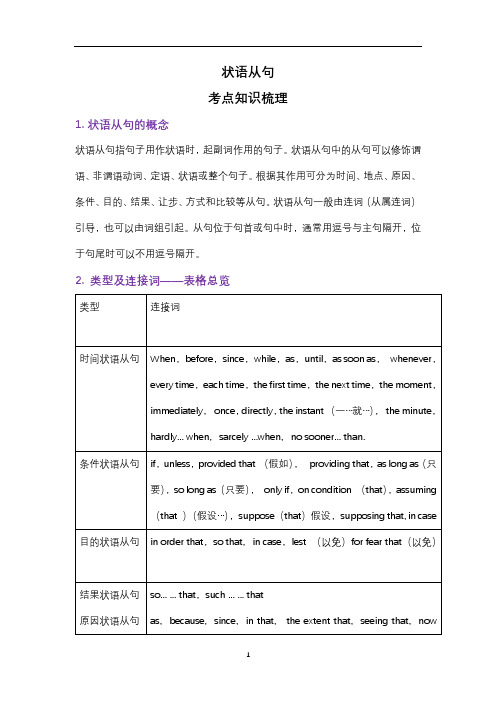
状语从句考点知识梳理1. 状语从句的概念状语从句指句子用作状语时,起副词作用的句子。
状语从句中的从句可以修饰谓语、非谓语动词、定语、状语或整个句子。
根据其作用可分为时间、地点、原因、条件、目的、结果、让步、方式和比较等从句。
状语从句一般由连词(从属连词)引导,也可以由词组引起。
从句位于句首或句中时,通常用逗号与主句隔开,位于句尾时可以不用逗号隔开。
2. 类型及连接词——表格总览易错知识点1. 时间/条件状语从句中时态的误用在时间/条件状语从句中遵循主将从现的原则1.1 易错例题1If the damage ____, it will take many years for the farmland to recover.A. has doneB. will be doneC. was doneD. is done【陷阱】考生忽略了if 引导的条件状语从句要用一般现在时表示将来的用法,错误地根据时态一致原则误填了B。
【分析】最佳答案选D。
在从属连词if,unless,as/so long as,on condition that 等引导的条件状语从句中,从句谓语动词常用一般现在时代替一般将来时,用一般过去时代替过去将来时。
【考题再现】Tell him the nuns as soon as he .A. is going to arriveB. will arriveC. arrivesD. is arriving【陷阱】考生认为事情还没有发生而用一般将来时,误选B。
【分析】最佳答案C。
本题是由as soon as引导的时间状语从句,由主句时态可知,从句谓语动词要用一般现在时表示将来,所以答案是arrives。
在when,before,after,once,until,till,as soon as,the moment,the minute,the instant等从属连词引导的时间状语从句中,从句谓语动词要用一般现在时表示将来或用一般过去时表示过去将来。
高考英语语法复习系列讲座-状语从句
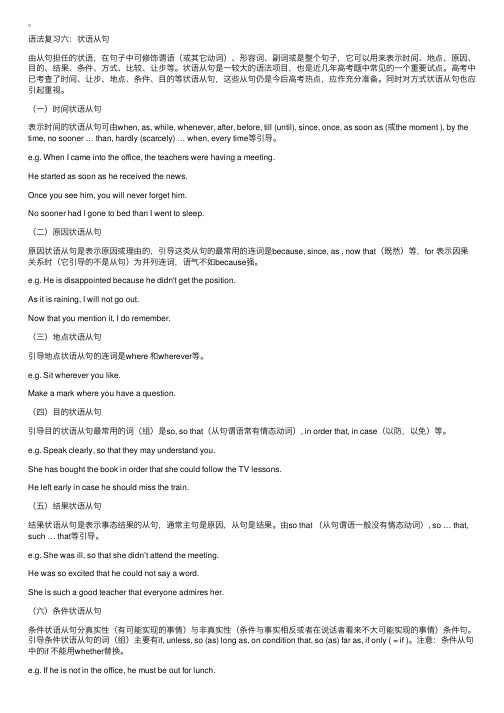
语法复习六:状语从句由从句担任的状语,在句⼦中可修饰谓语(或其它动词)、形容词、副词或是整个句⼦,它可以⽤来表⽰时间、地点、原因、⽬的、结果、条件、⽅式、⽐较、让步等。
状语从句是⼀较⼤的语法项⽬,也是近⼏年⾼考题中常见的⼀个重要试点。
⾼考中已考查了时间、让步、地点、条件、⽬的等状语从句,这些从句仍是今后⾼考热点,应作充分准备。
同时对⽅式状语从句也应引起重视。
(⼀)时间状语从句表⽰时间的状语从句可由when, as, while, whenever, after, before, till (until), since, once, as soon as (或the moment ), by the time, no sooner … than, hardly (scarcely) … when, every time等引导。
e.g. When I came into the office, the teachers were having a meeting.He started as soon as he received the news.Once you see him, you will never forget him.No sooner had I gone to bed than I went to sleep.(⼆)原因状语从句原因状语从句是表⽰原因或理由的,引导这类从句的最常⽤的连词是because, since, as , now that(既然)等,for 表⽰因果关系时(它引导的不是从句)为并列连词,语⽓不如because强。
e.g. He is disappointed because he didn't get the position.As it is raining, I will not go out.Now that you mention it, I do remember.(三)地点状语从句引导地点状语从句的连词是where 和wherever等。
高考英语语法——_状语从句习题及讲解
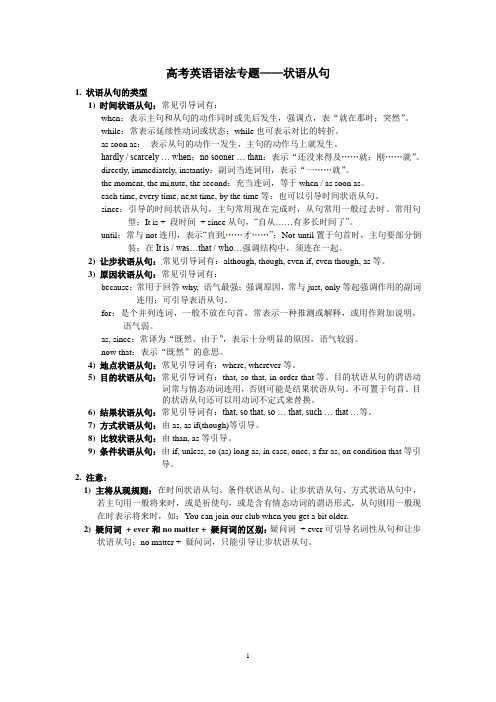
高考英语语法专题——状语从句1. 状语从句的类型1) 时间状语从句:常见引导词有:when:表示主句和从句的动作同时或先后发生,强调点,表“就在那时;突然”。
while:常表示延续性动词或状态;while也可表示对比的转折。
as soon as:表示从句的动作一发生,主句的动作马上就发生。
hardly / scarcely … when;no sooner … than:表示“还没来得及……就;刚……就”。
directly, immediately, instantly:副词当连词用,表示“一……就”。
the moment, the minute, the second:充当连词,等于when / as soon as。
each time, every time, next time, by the time等:也可以引导时间状语从句。
since:引导的时间状语从句,主句常用现在完成时,从句常用一般过去时。
常用句型:It is + 段时间+ since从句,“自从……有多长时间了”。
until:常与not连用,表示“直到……才……”;Not until置于句首时,主句要部分倒装;在It is / was…that / who…强调结构中,须连在一起。
2) 让步状语从句:常见引导词有:although, though, even if, even though, as等。
3) 原因状语从句:常见引导词有:because:常用于回答why, 语气最强;强调原因,常与just, only等起强调作用的副词连用;可引导表语从句。
for:是个并列连词,一般不放在句首,常表示一种推测或解释,或用作附加说明,语气弱。
as, since:常译为“既然、由于”,表示十分明显的原因,语气较弱。
now that:表示“既然”的意思。
4) 地点状语从句:常见引导词有:where, wherever等。
5) 目的状语从句:常见引导词有:that, so that, in order that等。
高考状语从句
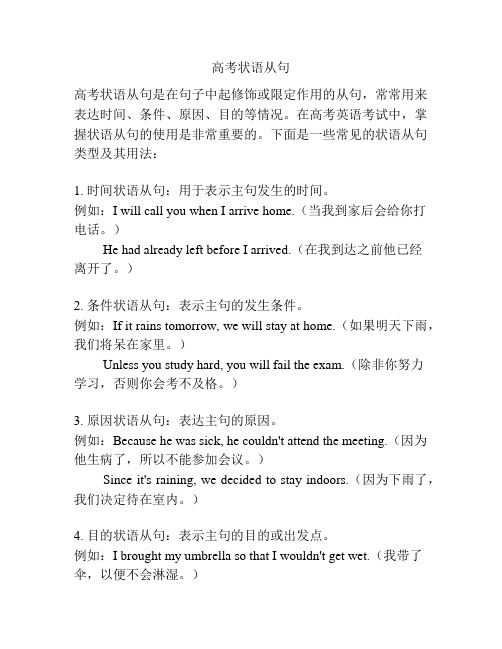
高考状语从句高考状语从句是在句子中起修饰或限定作用的从句,常常用来表达时间、条件、原因、目的等情况。
在高考英语考试中,掌握状语从句的使用是非常重要的。
下面是一些常见的状语从句类型及其用法:1. 时间状语从句:用于表示主句发生的时间。
例如:I will call you when I arrive home.(当我到家后会给你打电话。
)He had already left before I arrived.(在我到达之前他已经离开了。
)2. 条件状语从句:表示主句的发生条件。
例如:If it rains tomorrow, we will stay at home.(如果明天下雨,我们将呆在家里。
)Unless you study hard, you will fail the exam.(除非你努力学习,否则你会考不及格。
)3. 原因状语从句:表达主句的原因。
例如:Because he was sick, he couldn't attend the meeting.(因为他生病了,所以不能参加会议。
)Since it's raining, we decided to stay indoors.(因为下雨了,我们决定待在室内。
)4. 目的状语从句:表示主句的目的或出发点。
例如:I brought my umbrella so that I wouldn't get wet.(我带了伞,以便不会淋湿。
)He works hard in order that he can achieve his goals.(他努力工作以便能达到自己的目标。
)以上只是状语从句的几个常见用法,考生在备考过程中还需多加练习,加深对状语从句的理解和使用。
(完整版)高考英语专题复习状语从句(附答案)

高考英语专题复习状语从句(附答案)I. 考点分析状语从句可用来表示时间、地点、原因、目的、结果、条件、方式、比较和让步等。
1.时间状语从句1) 常见关联词有when, whenever, while, as, before, after 等。
2)注意not…until… 正常结构、倒装结构、强调结构、和until置于句首的用法。
He didn’t go to sleep until he had finished his homework. (正常结构)Not until he had finished his homework did he go to sleep. (倒装结构)It was not until he had finished his homework that he went to sleep.(强调结构)Until he had finished his homework he didn’t go to sleep. (until置于句首)3)表示“一……就……”的连词:once, as soon as, hardly/scarcely…when, no sooner…than, the minute, the moment, the instant, immediately, directly, instantly4)其他表示时间的短语还有:every time, next time, the day 等。
2.地点状语从句通常由where, wherever引导如:Where there is a will, there is a way.3.原因状语从句1) 通常由because, as ,since引导, 三者区别:because 语气最强,重在交待原因,以why引导的疑问句只能because用来回答;其前可用only, just等词强调;可用在It is…that…强调句型中。
2024届高考英语一轮复习语法:状语从句课件

The dog will eat a cake as soon as the cat leaves.
主句
从句
2.地点状语从句
地点状语从句
引导词:where + 强调形式
Wherever,everywhere,anywhere 不管哪里,任何地方,所有地方
2.地点状语从句 狗狗在发现蛋糕的地方吃了它。 The dog ate the cake where he found it.
1.时间状语从句 在某一时间之中 引导词:when while as
when: 时间点,“突然”
我到家的时候,狗狗在吃蛋糕。
The dog was eating a cake when I reached home.
e:时间段
我在做饭的过程中,狗狗在吃蛋糕。
The dog was eating a cake while I was cooking.
She is as beautiful as Snow White. 她和白雪公主一样漂亮.
3.比较状语从句
比较状语从句:更…
He is smarter than I. He is smarter than l am.
This cake is bigger than that one. This cake is bigger than that one is.
Because > since > as
因果/语气
原 因
because > since > as
状 语 because 引导的实实在在的因果关系
从 句
since 引导的是众所周知的事实
as 引导的是显而易见的事实
高考英语重要语法知识点“状语从句”全面解析,一定要牢牢掌握!

高考英语重要语法知识点“状语从句”全面解析,一定要牢牢掌握!时间状语从句1.when的用法(1)when既可引导一个持续性动作,也可引导一个短暂性动作,可用于表示主句和从句动作同时发生或从句动作先于主句动作,有时还可表示从句动作后于主句,意为“当..时候”。
(2)when在be about to do..when...be doing..when..had done..when...be on one’s wa...when...be on the point of doing..when..等结构中,作“那时突然”讲。
(3)when “既然、鉴于;尽管,虽然(位于主句之后);如果”2.while的用法(1)表示“当...时候”,引导的动作必须是延续性的。
(2)用作并列连词,表示相对关系“然而”。
(3)引导让步状语从句,相当于although,意为“虽然”,位于主句前。
(4)引导条件状语从句,相当于as/so long as,意为“只要”。
3.as的用法(1)表示“当...时候”,强调同时发生,不指先后。
(2)说明两种正在发展或变化的情况,表示“随着”,表示时间的推移。
(3)表示“一边...一边..”。
(4)强调两个动作紧接着发生。
(5)表示“虽然,尽管”。
(6)其他含义“正如,正像”,“作为”,“由于,因为”。
4.before的用法(1)一般意为“在..之前”“...才”,“..就”“还没有..”“免得”“不知不觉”“宁可,宁愿”,“否则,要不然”。
(2)It + will be/was + 时间段+before+一般现在时/一般过去时。
在肯定句中,意为“多长时间之后才”;在否定句中,意为“用不了多长时间就”。
5.until和till(1)与肯定句连用,必须是延续性动词。
(2)与否定句连用,必须是非延续性动词,表示“直到..才,在..之前不..”。
注意:not until可用于强调句和倒装句强调句:It is/was not until…that…倒装句:not until 放句首时,主句要部分倒装。
高考英语必考点专题——状语从句(精讲深剖)(含解析)

专题13 状语从句——精讲深剖一.语法填空1.(2019·新课标II卷)I don't see any reason to give up work. I love coming here and seeing my family and all the friends I have made over the years. I work not because I have to, ______ because I want to.”【答案】but【解析】考查并列连词。
根据句意逻辑可知,此处为转折关系,句意:我工作不是因为我不得不做,而是因为我想做。
此处用but与前文not 呼应,构成“不是……而是……”之意,故填but。
2.(2019·新课标III卷)On our way to the house,it was raining ______ hard that we couldn't help wondering how long it would take to get there. It was in the middle of Pearl City.【答案】so【解析】考查副词。
句意:在我们去那座房子的路上,雨下得如此大以至于我们不能不想还要多久才能到达那里。
“so…that…”意为“如此……以至于……”,引导结果状语从句。
故填so。
3.(2018·北京高考改编)________ we don't stop climate change, many animals and plants in the world will be gone.【答案】If【解析】句意:如果我们不阻止气候变化,世界上的许多动植物将会消失。
根据句意可知,此处应该用 if 引导条件状语从句,表示主句内容发生的条件。
4.(2018·天津高考改编)Let's not pick these peaches until this weekend so _______ they get sweet enough to be eaten.【答案】that【解析】so that “以便;为了”,在此处引导目的状语从句。
高考英语语法复习:八种状语从句的用法

高考英语语法复习:八种状语从句的用法状语从句状语从句有时间、地点、原因、目的、方式、结果、条件、让步等八种。
一、时间状语从句:引导词有after,before,as,once,since,till,until,when,whenever,while,as soon as,the moment/minute…(一…就),the time,the day,every time,next time,each time,by the time of,no sooner…than(一…就),ha rdly…when(一…就).例如:Each/Every time he comes here,he will drop in on me.每次他来这儿他都顺便看我.He was ill last time I saw him.上次我见到他时他病了.No sooner had she heard the news than she cried.她一听到这个消息就哭了.[辨析]when与whilewhen引导的从句动词可以是延续性的或短暂性的,while引导的从句中动词必须是延续性的;在“be…when…”句式中when表“at that time(就在这时)”意,这样用的when不能换为while;while有时并不表示时间,而表示对比,意“而”、“却”,when无这样的用法。
例如:When I got home I found the door locked./While(或When)we were working in the fields,it suddenly began to rain./He was wandering through the streets when a bike hit him./His pencil is red,while mine is yellow.[辨析]till与until一般情况下可以互换,但until可以位于句首,till则不能。
高考英语 第十四章 状语从句知识精讲
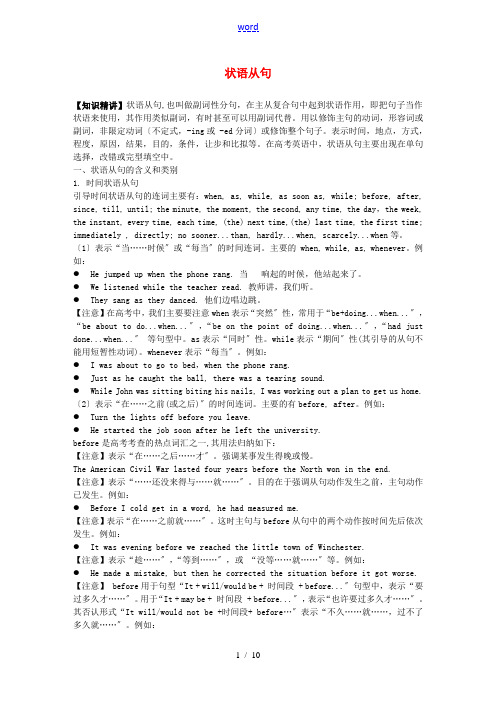
状语从句【知识精讲】状语从句,也叫做副词性分句,在主从复合句中起到状语作用,即把句子当作状语来使用,其作用类似副词,有时甚至可以用副词代替。
用以修饰主句的动词,形容词或副词,非限定动词〔不定式,-ing或 -ed分词〕或修饰整个句子。
表示时间,地点,方式,程度,原因,结果,目的,条件,让步和比拟等。
在高考英语中,状语从句主要出现在单句选择,改错或完型填空中。
一、状语从句的含义和类别1. 时间状语从句引导时间状语从句的连词主要有:when, as, while, as soon as, while; before, after, since, till, until; the minute, the moment, the second, any time, the day,the week, the instant, every time, each time, (the) next time,(the) last time, the first time; immediately , directly; no sooner...than, hardly...when, scarcely...when等。
〔1〕表示“当……时候〞或“每当〞的时间连词。
主要的 when, while, as, whenever。
例如:●He jumped up when the phone rang. 当响起的时候,他站起来了。
●We listened while the teacher read. 教师讲,我们听。
●They sang as they danced. 他们边唱边跳。
【注意】在高考中,我们主要要注意when表示“突然〞性,常用于“be+doing...when...〞,“be about to do...when...〞,“be on the point of doing...when...〞,“had just done...when...〞等句型中。
高考英语语法(九)状语从句(学生版)

九、状语从句(一)状语从句的四个特征1.相当于一个副词,也叫做()。
2.表谓语动作发生的时间、地点、原因、条件、方式、目的、结果等。
3.连词形式多样,可为单个连词、副词或()等。
4.连词后句子结构(),满足五个基本句型之一。
(二)内容及分类1.时间状语从句2.()状语从句3.原因状语从句4.()状语从句5.方式状语从句6.()状语从句7.结果状语从句 8.()状语从句9.让步状语从句e.g.1 ____ I saw him,he was taking with someone I didn’t know.e.g.2 The man dialed 110 ____ he was knocked down yesterday.e.g.3 I was absent from the class meeting _____ I overslept.e.g.4 _____ you could accept my apology,I will be grateful.e.g.5 You will master the skill _____ I teach you.e.g.6 They came to the place on schedule so that they couldn’t miss the appointment.e.g.7 We tried our best so much that we achieved our goal. e.g.8 What you do is sometimes more important ____ what you say.e.g.9 _______ the little baby can’t speak,she knows you.(三)时间状语从句1.常考连词2.常考区分(1)when, while, as(2)till, untile.g.1 In the party,some are singing _____ others are dancing.e.g.2 _____ time goes by,we can really tolerate more things.e.g.3 Believe it or not,he didn’t cry ________ you leave.3.常考句型(1)(主句)was/were doing when (从句)()e.g.1 My mother was cooking dinner ______ I get to my house. (2)(主句)was/were doing while (从句)()e.g.1 They were chatting _____ I was waiting for her patiently. (3)(主句)be about to do (从句)()e.g.1 I was about to go out for dinner _______ she appeared. (4)when ()es to ()e.g.1 _____ it es to using the equipment,you must be careful. (5)主句have/has/had done since n./短语/从句()e.g.1 It has been 10 years ________ we met.(6)主将从现(主句)will do (从句)()(主句)would do (从句)()(连词:if,when,as long as,as soon as…)e.g.1 As _____ as you admit your mistake,they will forgive you.(四)地点状语从句1.常考连词_______,wherever,everywhere2.区分e.g.1 Where there is a will,there is a way.e.g.2 We should learn to stand up where we fall.(五)原因状语从句1.常考连词2.区分:because,since,as,fore.g.1 We have no choice but to work harder nowadays,for the situation we are facing gets fiercer.(六)条件状语从句1.连词2.主将从现e.g.1 I __________(sit) beside you if you don’t mind.(七)方式状语从句1.常用连词________,as if,as though,(in) the way (that),like2.as if/as though引导的方式状语从句(1)常位于()后。
- 1、下载文档前请自行甄别文档内容的完整性,平台不提供额外的编辑、内容补充、找答案等附加服务。
- 2、"仅部分预览"的文档,不可在线预览部分如存在完整性等问题,可反馈申请退款(可完整预览的文档不适用该条件!)。
- 3、如文档侵犯您的权益,请联系客服反馈,我们会尽快为您处理(人工客服工作时间:9:00-18:30)。
状语从句1 地点状语从句地点状语从句通常由where, wherever 引导。
Where I live there are plenty of trees.我住的地方树很多。
Wherever I am I will be thinking of you. 不管我在哪里我都会想到你。
2 方式状语从句方式状语从句通常由as, (just) as…so…, as if, as though引导。
1)as, (just) as…so…引导的方式状语从句通常位于主句后,但在(just) as…so…结构中位于句首,这时as从句带有比喻的含义,意思是"正如…","就像",多用于正式文体,例如:Always do to the others as you would be done by.你希望人家怎样待你,你就要怎样待人。
As water is to fish, so air is to man.我们离不开空气,犹如鱼儿离不开水。
Just as we sweep our rooms, so we should sweep backward ideas from our minds.正如打扫房屋一样,我们也要扫除我们头脑中落后的东西。
2)as if, as though两者的意义和用法相同,引出的状语从句谓语多用虚拟语气,表示与事实相反,有时也用陈述语气,表示所说情况是事实或实现的可能性较大。
汉译常作"仿佛……似的","好像……似的",例如:They completely ignore these facts as if (as though) they never existed.他们完全忽略了这些事实,就仿佛它不存在似的。
(与事实相反,谓语用虚拟语气。
)He looks as if (as though) he had been hit by lighting.他那样子就像被雷击了似的。
(与事实相反,谓语用虚拟语气。
)It looks as if the weather may pick up very soon.看来天气很快就会好起来。
(实现的可能性较大,谓语用陈述语气。
)说明:as if / as though也可以引导一个分词短语、不定式短语或无动词短语,例如:He stared at me as if seeing me for first time.他目不转睛地看着我,就像第一次看见我似的。
He cleared his throat as if to say something.他清了清嗓子,像要说什么似的。
The waves dashed on the rocks as if in anger.波涛冲击着岩石,好像很愤怒。
3 原因状语从句比较:because, since, as和for1)because语势最强,用来说明人所不知的原因,回答why提出的问题。
当原因是显而易见的或已为人们所知,就用as或since。
I didn't go, because I was afraid.Since /As the weather is so bad, we have to delay our journey.2)由because引导的从句如果放在句末,且前面有逗号,则可以用for来代替。
但如果不是说明直接原因,而是多种情况加以推断,就只能用for。
He is absent today, because / for he is ill.He must be ill, for he is absent today.4 目的状语从句表示目的状语的从句可以由that, so that, in order that, lest, for fear that, in case等词引导,例如:Y ou must speak louder so that /in order that you can be heard by all.He wrote the name down for fear that(lest) he should forget it.Better take more clothes in case the weather is cold.5 结果状语从句结果状语从句常由so… that 或such…that引导,掌握这两个句型,首先要了解so 和such 与其后的词的搭配规律。
比较:so和such其规律由so与such的不同词性决定。
such 是形容词,修饰名词或名词词组,so 是副词,只能修饰形容词或副词。
so 还可与表示数量的形容词many, few, much, little连用,形成固定搭配。
so foolish such a foolso nice a flower such a nice flowerso many / few flowers such nice flowersso much / little money. such rapid progressso many people such a lot of people(so many 已成固定搭配,a lot of 虽相当于many,但 a lot of 为名词性的,只能用such 搭配。
)so…that与such…that之间的转换既为so与such之间的转换。
The boy is so young that he can't go to school.He is such a young boy that he can't go to school6 条件状语从句连接词主要有if, unless, as/so long as, on condition that 等。
.if 引导的条件句有真实条件句和非真实条件句两种。
非真实条件句已在虚拟语气中阐述。
unless = if not.Let's go out for a walk unless you are too tired.If you are not too tied, let's go out for a walk.典型例题Y ou will be late ___ you leave immediately.A. unlessB. untilC. ifD. or答案A。
句意:除非你立即走,否则你就回迟到的。
可转化为If you dong leave immediately, you will be late.B、D句意不对,or表转折,句子如为Y ou leave immediately or you will be late.7 让步状语从句though, although注意:当有though, although时,后面的从句不能有but,但是though 和yet可连用Although it's raining, they are still working in the field.虽然在下雨,但他们仍在地里干活。
He is very old, but he still works very hard.虽然他很老,但仍然努力地工作。
Though the sore be healed, yet a scar may remain.伤口虽愈合,但伤疤留下了。
(谚语)典型例题1)___she is young, she knows quite a lot.A. WhenB. HoweverC. AlthoughD. Unless答案:C。
意为虽然她很年轻,却知道许多。
2)as, though 引导的倒装句as / though引导的让步从句必须表语或状语提前(形容词、副词、分词、实义动词提前)。
Child as /though he was, he knew what was the right thing to do.= Though he was a small child, he knew what was the right thing to do.注意: a.句首名词不能带任何冠词。
b.句首是实义动词,其他助动词放在主语后。
如果实义动词有宾语和状语,随实义动词一起放在主语之前。
Try hard as he will, he never seems able to do the work satisfactorily.= Though he tries hard, he never seems…虽然他尽了努力,但他的工作总做的不尽人意。
3)ever if, even though.即使We'll make a trip even though the weather is bad.4) whether…or-不管……都Whether you believe it or not, it is true.5)"no matter +疑问词" 或"疑问词+后缀ever"No matter what happened, he would not mind.Whatever happened, he would not mind.替换:no matter what = whatever no matter who = whoeverno matter when = whenever no matter where = whereverno matter which = whichever no matter how = however注意:no matter 不能引导主语从句和宾语从句。
(错)No matter what you say is of no use now.(对)Whatever you say is of no use now.你现在说什么也没用了。
(Whatever you say是主语从句)(错)Prisoners have to eat no matter what they're given,(对)Prisoners have to eat whatever they're given.囚犯们只能给什么吃什么。
8 比较while, when, as1)as, when 引导短暂性动作的动词。
Just as / Just when / When I stopped my car, a man came up to me.2)当从句的动作发生于主句动作之前,只能用when 引导这个从句,不可用as 或while。
